
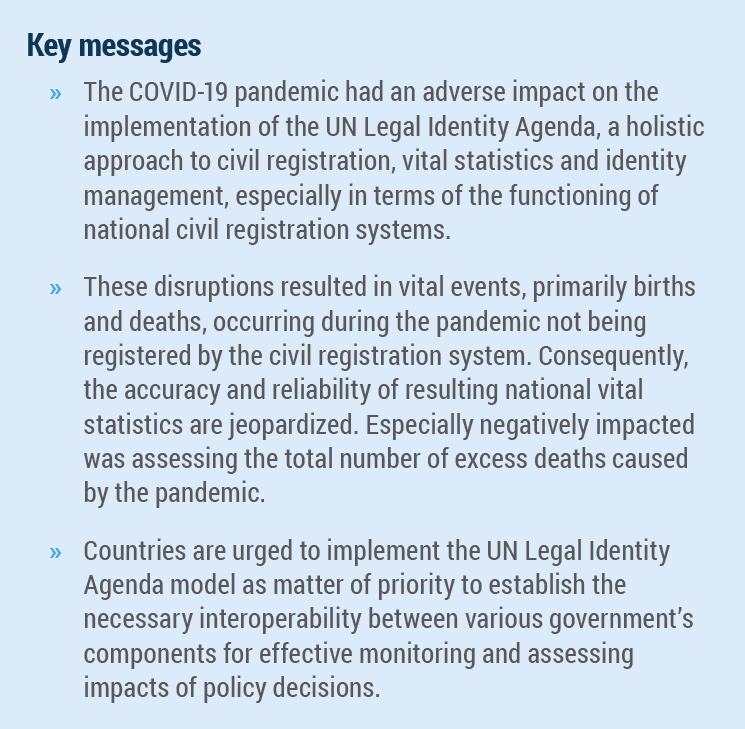 The UN legal identity agenda
The UN legal identity agenda
The UN Legal Identity Agenda consists of a holistic approach to ensure complete civil registration and universal registration of all vital events, the production of regular, comprehensive and accurate vital statistics, and the establishment and maintenance of population registers and identity management apparatus from the birth to the death of each individual. There should be full interoperability between these functions in a simultaneous manner, in accordance with international standards and recommendations and it is graphically presented below (see figure 1). In March 2020 the Statistical Commission endorsed the United Nations Legal Identity Agenda as an expansion of the existing methodological framework for civil registration and vital statistics. It urged Member States to implement the Legal Identity Agenda as a matter of priority and acknowledged the establishment of the UN Legal Identity Task Force, consisting of fifteen UN agencies and programmes and co-chaired by UNDESA, UNDP and UNICEF. 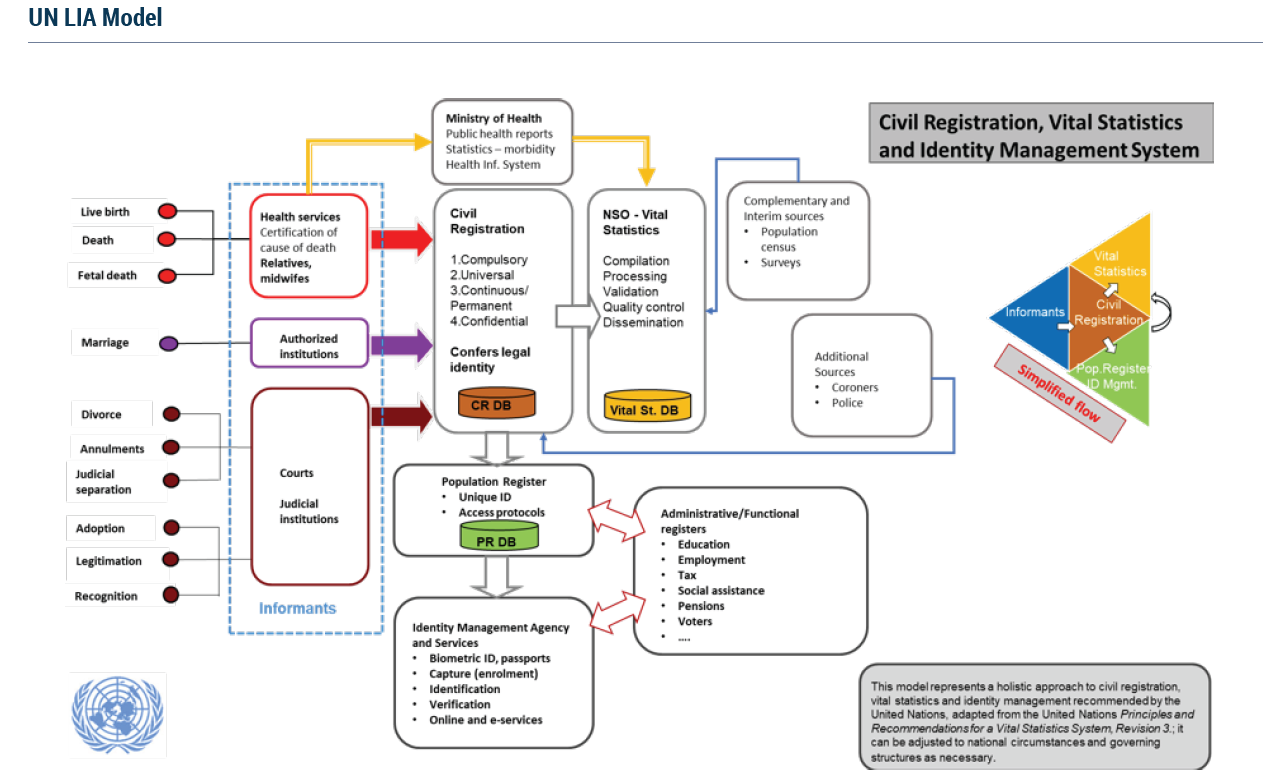
COVID-19 impact on civil registration
The COVID-19 pandemic was declared by WHO in March 2020. Shortly thereafter and recognizing the negative impact of the measures designed to mitigate the pandemic on the registration of the occurrence of births, deaths and other vital events, the UN LIA Task Force issued a set of recommendations aimed at maintaining civil registration during the pandemic. These recommendations urged national registration authorities to simplify the registration procedures; expand eligibility for being a notifier of the occurrence of a vital event; wave late-registration fees; inform the public on the best ways to register vital events; maintain the existing reporting channels with relevant government components, such as health sector and national statistics authorities, among other. In May 2020, shortly after COVID-19 was declared a pandemic, the Statistics Division/DESA, as one of the co-chairs of the United Nations Legal Identity Agenda Task Force launched a survey to assess the impact of the pandemic on the functioning of civil registration and the production of reliable vital statistics3. In addition, a series of webinars were conducted by the Statistics Division in close coordination with international and regional partners, the Global Civil Registration and Vital Statistics Group, United Nations Economic and Social Commission for Asia and the Pacific, the United Nations Economic Commission for Africa, the United Nations Economic Commission for Latin America and the Caribbean, the Secretariat of the Pacific Community, the Organization of American States and the Caribbean Community. The webinars were designed (a) as an introduction to the United Nations Legal Identity Agenda and international standards for civil registration and vital statistics and their implementation in countries/areas; (b) to address the impact on the operations and maintenance of civil registration and production of vital statistics in the time of COVID-19 pandemic; (c) to address the short- and long-term consequences on registration of vital events due to the pandemic; and (d) to address how to ensure universal civil registration of all vital events and production of comprehensive, reliable and regular vital statistics, beyond the COVID-19 pandemic,. These webinars took place between May and December 2020 with the participation of countries from the Pacific, Africa (anglophone and francophone countries) and Latin America and the Caribbean, with the participation of around 50 countries and/or areas and over 100 experts. The results of the survey and the documentation collected through the series of webinars on the impact of the COVID-19 pandemic on the functioning of civil registration and, consequently, on the production of vital statistics, conveyed two distinct tracks. In a number of countries, the functioning of civil registration was adversely affected as a result of instituted lockdowns, working from home, overall reluctance for registering the occurrence of vital events from fear of contagion and nonexistence of digitized systems for civil registration that would eliminate the need for physical interaction. Consequently, the registration of births and deaths in those countries actually decreased in 2020 compared to previous years. In countries where the civil registration system was able to function properly during the pandemic a number of registered deaths increased significantly resulting in “excess deaths” owing to the COVID-19 pandemic.
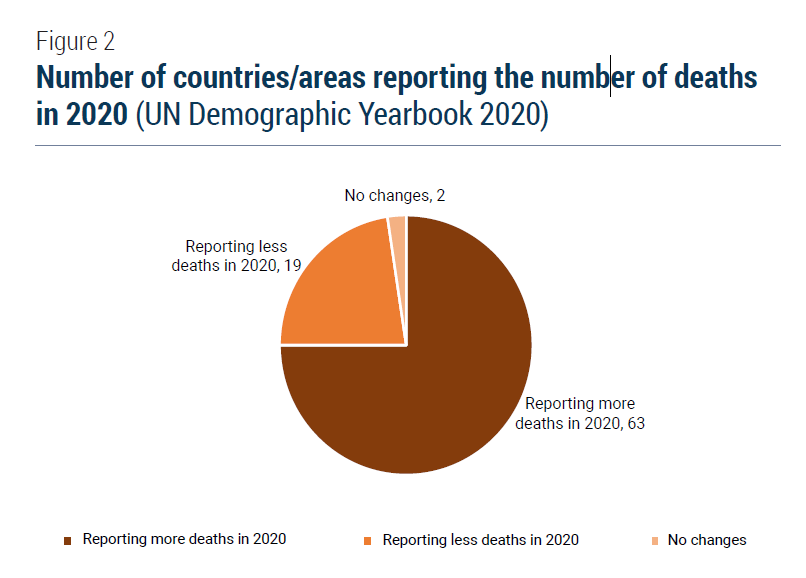 The UN demographic yearbook’s vital statistics
The UN demographic yearbook’s vital statistics
Further information on the reliability of vital statistics relying on civil registration is presented in the United Nations Demographic Yearbook - one of the oldest and most referenced publications of the United Nations. It provides a unique collection of demographic statistics for world’s countries/areas every year. The current 71st edition, posted in the first week of December 2021, displays vital statistics for the year 2020 as reported by the official national statistical authorities. All the data are treated as preliminary; yet they further illustrate the findings on the two-way impact of the pandemic on the functioning of civil registration and the resulting vital statistics. In the first, a number of countries/areas are reporting a significant increase in the number of deaths in 2020. In the second, there are countries/areas reporting fewer deaths than in the previous year, suggesting either that the COVID-19 pandemic adversely affected the civil registration system and not all the deaths that occurred during the pandemic were actually registered and were thus not reflected in vital statistics reported to the United Nations, or that the actual number of deaths decreased as a result of the population being in a lockdown, thus not being exposed to certain risks, such as traffic accidents and the like. Therefore, as presented in Figure 2, out of 84 countries/ areas that reported 2020 mortality statistics, 63 (75%) reported an increase in the number of deaths, 19 (23%) reported fewer deaths than in 2019, and 2 (2%) did not report sizable changes. 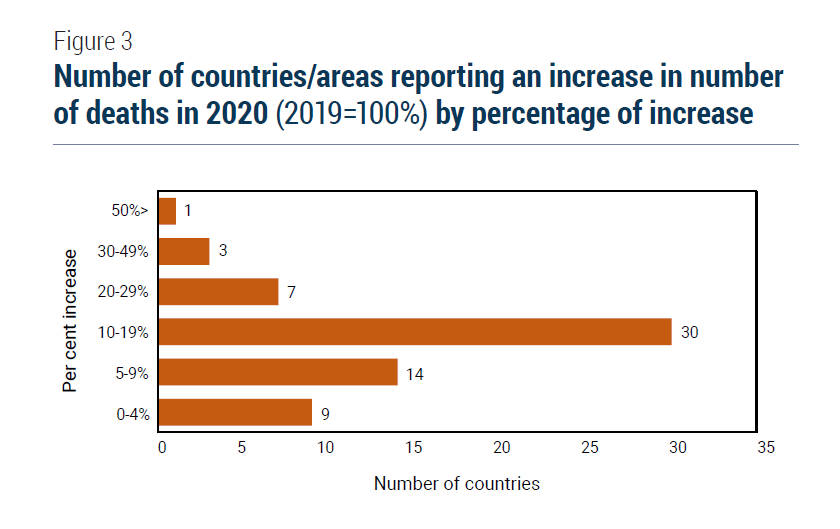 Illustrating the significant impact that the pandemic inflicted on the overall mortality in countries/areas reporting more deaths in 2020, Figure 3 presents the percentage of that increase - and by far most countries/areas (30 in all) reported an increase between ten and nineteen per cent compared to 2019. As for the countries/areas reporting a decrease in the number of deaths, most (9 in total) indicated a decrease of up to five per cent compared to 2019, as per Figure 4 below. As presented above, the UN Demographic Yearbook 2020 displays vital statistics for 84 countries/areas out of a total of 234 countries/areas to which such a request was initially dispatched, clearly illustrating the capacity of numerous countries/ areas – or the lack of it – to produce vital statistics on a regular, annual basis and that was exacerbated by the impact of the COVID-19 pandemic, as per the documentation presented in paragraph 4.
Illustrating the significant impact that the pandemic inflicted on the overall mortality in countries/areas reporting more deaths in 2020, Figure 3 presents the percentage of that increase - and by far most countries/areas (30 in all) reported an increase between ten and nineteen per cent compared to 2019. As for the countries/areas reporting a decrease in the number of deaths, most (9 in total) indicated a decrease of up to five per cent compared to 2019, as per Figure 4 below. As presented above, the UN Demographic Yearbook 2020 displays vital statistics for 84 countries/areas out of a total of 234 countries/areas to which such a request was initially dispatched, clearly illustrating the capacity of numerous countries/ areas – or the lack of it – to produce vital statistics on a regular, annual basis and that was exacerbated by the impact of the COVID-19 pandemic, as per the documentation presented in paragraph 4.
DESA/WHO technical advisory group on covid-19 mortality assessment
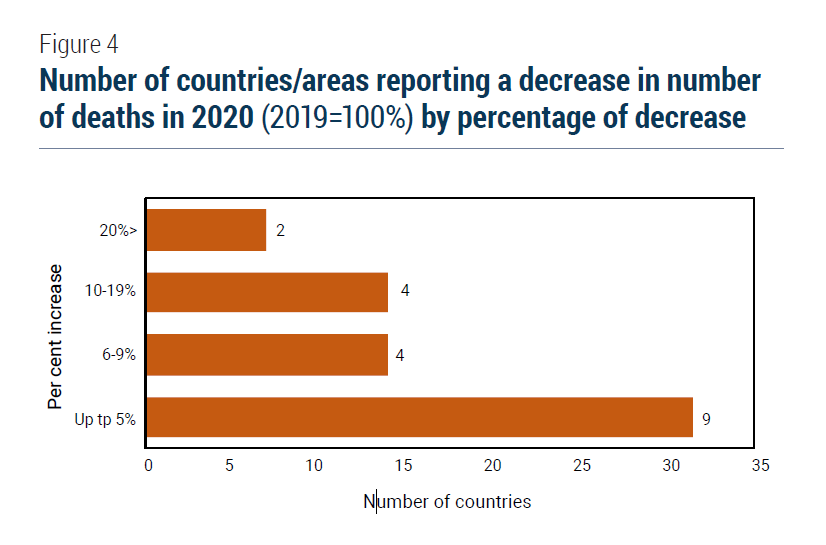 In order to better understand the impact of the COVID-19 pandemic on overall mortality, the World Health Organization and the UN Department of Economic and Social Affairs established in January 2021 the Technical Advisory Group (TAG) on COVID-19 Mortality Assessment with a primary goal to advise and support WHO and the Department of Economic and Social Affairs in assisting Member States to obtain accurate estimates of numbers of deaths attributable to the direct and indirect impact of the COVID-19 pandemic. The Technical Advisory Group established five working groups to ensure a comprehensive and multi-dimensional approach to delivering on its responsibilities. The Working Group #3 - Death registration and reporting systems: Lessons from the pandemic - focuses on the registration of deaths during the COVID-19 pandemic. Specifically, in a number of countries and areas, the pandemic has had an adverse impact on the functioning of the civil registration system, in particular for the registration of deaths and issuance of death certificates, due possibly to pre-existing deficiencies in registration systems or to the breakdown of such systems during the pandemic, according to the results of the survey and the webinars conducted in 2020 (see paragraphs 3 and 4 above). These deficiencies have resulted in data gaps that constrain the timely and reliable assessment of numbers of deaths and of levels and patterns of mortality. Simultaneously, national health systems, facing a once-in-a-century pandemic and stretched to their limits, have had difficulties in maintaining regular functions, such as the reporting of deaths and causes of death to the civil registration system, which ultimately has resulted in discrepancies between sources concerning numbers of deaths caused by COVID-19. In discussing the relevant national experiences, the group outlined several points that should be taken into consideration by national authorities:
In order to better understand the impact of the COVID-19 pandemic on overall mortality, the World Health Organization and the UN Department of Economic and Social Affairs established in January 2021 the Technical Advisory Group (TAG) on COVID-19 Mortality Assessment with a primary goal to advise and support WHO and the Department of Economic and Social Affairs in assisting Member States to obtain accurate estimates of numbers of deaths attributable to the direct and indirect impact of the COVID-19 pandemic. The Technical Advisory Group established five working groups to ensure a comprehensive and multi-dimensional approach to delivering on its responsibilities. The Working Group #3 - Death registration and reporting systems: Lessons from the pandemic - focuses on the registration of deaths during the COVID-19 pandemic. Specifically, in a number of countries and areas, the pandemic has had an adverse impact on the functioning of the civil registration system, in particular for the registration of deaths and issuance of death certificates, due possibly to pre-existing deficiencies in registration systems or to the breakdown of such systems during the pandemic, according to the results of the survey and the webinars conducted in 2020 (see paragraphs 3 and 4 above). These deficiencies have resulted in data gaps that constrain the timely and reliable assessment of numbers of deaths and of levels and patterns of mortality. Simultaneously, national health systems, facing a once-in-a-century pandemic and stretched to their limits, have had difficulties in maintaining regular functions, such as the reporting of deaths and causes of death to the civil registration system, which ultimately has resulted in discrepancies between sources concerning numbers of deaths caused by COVID-19. In discussing the relevant national experiences, the group outlined several points that should be taken into consideration by national authorities:
◆ Maintain timeliness – the more time that elapses between the occurrence of vital events, especially unregistered deaths, the more difficult it would be to fill the gaps and rectify the non-registration;
◆ Introduce interim solutions – for example, several experiences involving collecting and compiling data directly from cemeteries and funeral homes during the pandemic yielded valuable information;
◆ Re-iterate the need to fully implement UN LIA as the fully developed model of interoperability of various components;
◆ Define a minimal standard in times of pandemic – simplify the registration procedures, waive late-registration fees;
◆ Learn from national experiences – countries adapted to the circumstances and these practices provide a valuable documentation that needs to be followed-up and synthesized;
◆ Digitize the civil registration system – enabling online registration of vital events proved to be effective in time of pandemic as demonstrated by a number of countries that utilized the pandemic as a major catalyst for developing and deploying digital civil registration applications.
Concluding remarks
The impact of the pandemic that still affects many regions of the world clearly and unambiguously points to the need to ensure the constant and uninterrupted flow of relevant data regarding the occurrence of vital events, especially births and deaths, from the very moment of occurrence. The health sector, in its critical role as an informant and the certifier of the causes of deaths, needs to ensure that the notification of the occurrence is transmitted to the civil registration authority that provides the legal certificate of the event and confers legal identity to newborns and the retirement of the legal identity of the deceased. The UN LIA model then requires that the information from civil registration authorities is forwarded to the national statistical authorities to compile and produce relevant, accurate and regular vital statistics, and to the national ID systems that will ensure and add layers of legal identity for all from birth to death. The need to firmly establish continuous and universal civil registration of all vital events, translated into vital statistics and legal identity for all, has never been so evident.
 Welcome to the United Nations
Welcome to the United Nations